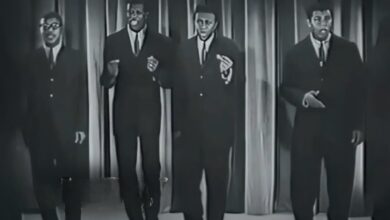Billy J. Kramer & The Dakotas’ “Little Children” Breaks the Mold and Tops the U.S. Charts in 1964
When “Little Children” hit No. 1 on the UK Singles Chart and climbed to No. 7 on the U.S. Billboard Hot 100 in 1964, it marked a surprising but significant shift for both Billy J. Kramer & The Dakotas and the British Invasion at large. Known for their earlier Lennon–McCartney-penned hits, the group stepped out from under The Beatles’ shadow with a daring and slightly cheeky pop single that explored uncharted lyrical territory. With a steady rhythm, rich instrumentation, and Kramer’s commanding vocal, “Little Children” became their biggest international success and an unexpected cultural talking point—revealing how pop music was beginning to mature in both form and subject.
Billy J. Kramer, born William Howard Ashton in Bootle, Lancashire, was a product of Liverpool’s thriving early ‘60s music scene. Like many of his contemporaries, he emerged from the Merseybeat movement and gained early support from Beatles manager Brian Epstein, who paired him with The Dakotas, a Manchester band that had already made a name for themselves backing other singers. Kramer’s polished looks, smooth vocal delivery, and charming stage presence made him a natural teen idol. Yet what truly set him apart was his ability to navigate songs that required both vocal range and emotional nuance—a quality that “Little Children” would test in unexpected ways.
Unlike many of his early hits such as “Do You Want to Know a Secret” and “Bad to Me,” both written by Lennon and McCartney, “Little Children” came from a different songwriting team: Mort Shuman and John Leslie McFarland. Shuman, known for co-writing hits like “Save the Last Dance for Me” and “This Magic Moment,” was a respected figure in the Brill Building scene. With “Little Children,” he and McFarland penned a song that stood out not for its romantic appeal, but for its narrative point of view—a young man pleading with his girlfriend’s younger siblings not to expose their secret love affair. It was playful, slightly provocative, and utterly unique.
The song was recorded in London at Abbey Road Studios, with George Martin, the legendary Beatles producer, once again at the controls. Martin’s production gave the track a crisp, modern sound, driven by a marching beat, elegant piano lines, and a steady bassline that kept the song anchored. Kramer’s vocal carried a mix of charm and authority, moving from gentle persuasion to confident assertion as he urged the children not to “tell on us.” It was a performance that required just the right balance of innocence and mischief—one that Kramer delivered with a knowing wink rather than a wink too far.
Released in February 1964, “Little Children” quickly became a transatlantic hit. In the UK, it reached No. 1 on March 26 and held the top spot for two weeks, knocking off Cilla Black’s “Anyone Who Had a Heart.” In the U.S., where the British Invasion was just gaining steam, the song broke into the Billboard Top 10 and became one of the first British hits of the era not associated directly with The Beatles to find major success. The song spent 11 weeks on the American chart and became a staple on AM radio throughout the spring and summer.
What made “Little Children” so impactful was its boldness. At a time when most pop lyrics focused on straightforward declarations of love or heartbreak, the song’s scenario—a young man negotiating with his girlfriend’s siblings—felt both specific and cinematic. It was the kind of story rarely told in pop songs, and it hinted at how lyrical content was beginning to broaden as 1960s songwriting matured. The playful tone disguised a deeper narrative about secrecy, youth, and relationships—a far cry from the innocent puppy love of just a few years prior.
The success of the single also gave Billy J. Kramer a much-needed boost in artistic credibility. Until then, his image was largely tied to his association with The Beatles, whose compositions had powered his early career. With “Little Children,” Kramer and The Dakotas proved they could hold their own with original material and a distinct identity. The hit gave them access to larger American tours and TV appearances, including the coveted Ed Sullivan Show, where they performed for millions of American viewers at the height of Beatlemania.
Musically, the track helped usher in a more narrative-driven approach to British pop, influencing other artists to experiment with lyrical perspective and storytelling. While the subject matter of “Little Children” may have been lighthearted, it opened doors for songs that moved beyond the conventional boy-meets-girl format. Its production also reflected a growing sophistication in British studio work, thanks in part to George Martin’s layered arrangements and Kramer’s evolving vocal control.
Though “Little Children” has not been as frequently covered as other British Invasion staples, it remains one of the era’s more distinctive songs. It was notably revived by The Knickerbockers in the mid-’60s and has been referenced in retrospectives exploring the quirks and boundaries of early pop storytelling. The song’s unique point of view continues to fascinate music historians who point to it as a precursor to the more character-driven lyrics that would define much of 1970s singer-songwriter output.
At the time of its success, Kramer was enjoying the peak of his popularity, but the British music scene was shifting quickly. By 1965, tastes had turned toward edgier sounds and more socially conscious lyrics, and Kramer’s smooth style began to feel out of step with the countercultural mood. Still, he remained active, recording and performing throughout the decade, and continuing to build a dedicated fan base in both the UK and the U.S.
In the decades that followed, “Little Children” remained a highlight in Kramer’s live sets and a beloved oddity in the catalog of British Invasion hits. Its inclusion on numerous compilations and radio playlists kept it alive for new generations, even as its playful theme occasionally sparked conversation about how pop music reflects and reshapes cultural norms.
While Billy J. Kramer would never again match the chart success of “Little Children,” the song ensured him a lasting legacy. It captured a fleeting moment in pop history when innocence, wit, and narrative surprise could combine for a worldwide smash. It also stands as one of the few songs of the era that dared to tell a story from an unusual perspective—and succeeded because of it.
In the end, “Little Children” is more than a clever slice of early British pop. It’s a testament to the genre’s willingness to evolve, to take risks, and to charm its way into listeners’ hearts with both melody and mischief. For Kramer, it was a defining moment. For music history, it was a sign that the British Invasion wasn’t just about guitars and haircuts—it was about storytelling, too.



